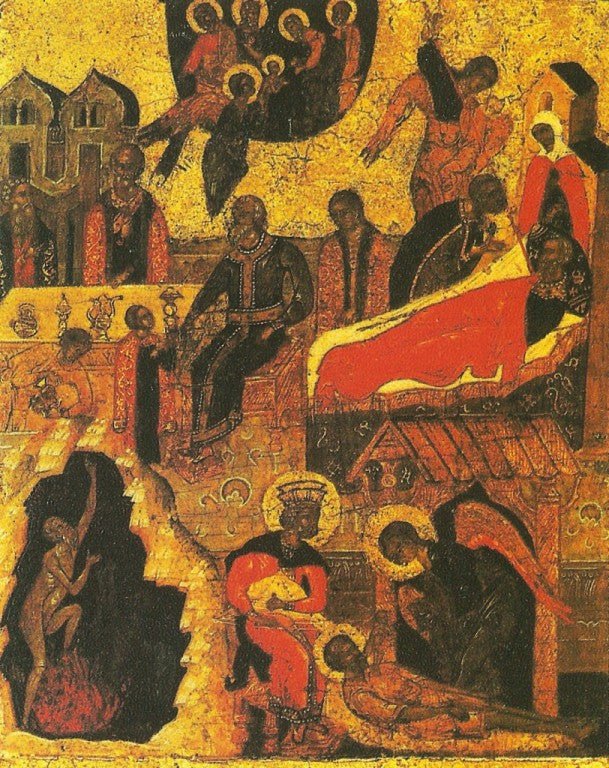Sermon for the 21st Sunday after Pentecost

The parable of the Rich Man and Lazarus has many different meanings and much has been written about this powerful and beautiful story. But the fundamental meaning is really about life and death.
At the end of today’s Gospel we hear the rich man say to Father Abraham, “I beg you therefore, father, that you would send Lazarus to my father’s house, for I have five brothers, that he may testify to them, lest they also come to this place of torment. Abraham said to him, ‘they have Moses and the prophets; let them hear them.’ And he said, ‘No father Abraham; but if one goes to them from the dead, they will repent.’ But Abraham said to him, ‘if they do not hear Moses and the prophets, neither will they be persuaded though one rise from the dead.”
Basically, Christ is trying to wake us up from our lethargy telling us in this parable that death is coming for each one of us at any moment and that how we live our lives today will determine how we spend eternity. It is too late after death to repent.
Is Christ trying to scare us or frighten us and make our life gloomy and dark. Are we suppose to live each day under the fear of death ….. St. Benedict the great father of western monasticism says that we should keep death daily before our eyes. What does he mean? Are we suppose to be all gloomy and dark?
The real meaning of what St. Benedict is asking us to do and what Our Saviour is telling us about in today’s Gospel, is about the importance of truly living our life, authentically and fully. There is no time to waste on idle words and nonsense. Life is short. Run while you have the light of day!
If you really thought that you were going to die today, how differently would you live this day?
How much more sincere and heartfelt would your prayers be?
How much more loving and genuine would your conversations be with those close to you?
There would be no time wasted in idle talk or gossip, no time for slander … every moment would be precious.
If we were to know that the words that I am now speaking to you were the last words I would ever speak to you, how differently would I say them, and how differently would you listen!
My brothers & sisters, the reason that we live such superficial lives, filled with shallow conversations and wasted time, the reason that we say such cruel words to each other and spend our time accumulating useless things and defining our territory is that we live as though this life were merely a dress-rehearsal of the life that we will one day live.
One day soon, I’ll really repent,
one day soon I’ll really stop gossiping,
one day soon I’ll really start to pray,
one day soon I’ll really make an effort to restore those broken friendships,
one day soon I’ll spend my time constructively,
one day soon I’ll really turn my life around!
But that “one day” doesn’t come and suddenly we’re old, or sick or in an accident and facing death saying, “this isn’t suppose to happen yet, I haven’t really begun to live my life the way I wanted to.”
Perhaps I could have been a saint, a great man but I have settled for a superficial life, always imagining that one day I would really change.
The injunction of St. Benedict to “keep death daily before our eyes” is not a call to live with a sense of dread in the constant awareness that death is about to overtake us. It means rather: ‘be aware of the fact that what you are saying now, doing now, hearing, enduring or receiving now may be the last event or experience of your present life’. In which case it must be authentic, loving, compassionate and faithful. It must express all the desire for good that you have. All your desire to serve Christ faithfully. It must be the fullest expression of who you really want to be, it must be a confirmation of your faith and hope in Christ …. How could it be sensual or casual or superficial at a time like this?
The only way to really live our life authentically and fully is with the remembrance of death. This is the essence to today’s Gospel.
Only awareness of death will give life this authenticity and depth, only an awareness of death will bring real life to life. This is the way that all of our great monastic fathers and ascetics fought against lethargy and apathy. This is how they fought against mindlessness, lack of attention and carelessness. They found that the remembrance of death brought meaning and purpose and heart-felt prayer and real love into each moment of their daily life.
+ In the Name of the Father, and of the Son, and of the Holy Spirit. Amen.


Leave a comment